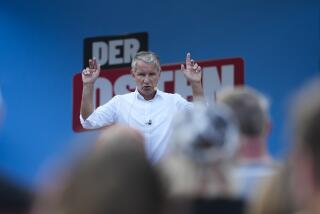Genscher Surrenders Party Leadership : Free Democrats’ New Leader Is W. German Economics Minister
BONN — West German Foreign Minister Hans-Dietrich Genscher formally stepped down Saturday as head of West Germany’s small but important Free Democratic Party but said he plans to retain his government post at least until the next scheduled national elections in 1987.
Genscher, 57, was replaced as party leader by Economics Minister Martin Bangemann, 50, by a vote of 352 to 31 at a party congress in the western industrial city of Saarbruecken.
Bangemann, a lawyer who, like Genscher, was born in what is now East Germany, pledged to heal the splits in the deeply divided party that is threatened with political extinction. “We must remove the troublemakers from the party,” he told the delegates.
Genscher is the West’s longest-serving foreign minister, and his efforts over the past 10 1/2 years to project his country as both a reliable member of the Western alliance and a bridge to the East are widely acknowledged as a success.
But his role as a party leader has been marked by controversy, and he has been blamed by critics in the party for its steep slide in the polls in recent years.
Bolted Schmidt Government
Genscher’s decision in October, 1982, to topple Chancellor Helmut Schmidt’s government by pulling the Free Democrats out of a 12-year-old coalition with the Social Democrats and join forces with the conservative Christian Democrats split his party and soured its national image.
Genscher’s personal popularity plummeted, and his grip on the party weakened. The switch also raised questions among voters about where the Free Democrats stood in the political spectrum.
Under severe pressure from party colleagues, Genscher agreed last year to give up the leadership at this weekend’s party convention.
In a farewell address to delegates at the packed party convention, Genscher on Saturday urged the Free Democrats to unite behind a new party platform emphasizing free enterprise and individual rights and to leave behind the left-liberal views that have characterized the party’s position.
He also urged the convention to support Bangemann, a virtual political unknown who lost his seat in the European Parliament in last June’s election when the Free Democrats failed to win the required 5% of the vote for representation.
Damaged by Scandal
The Free Democrats have also been badly damaged by scandal surrounding their most dynamic figure, Bangemann’s predecessor as economics minister, Otto Lambsdorff, now under indictment for bribery.
From a high of more than 10% of the vote in the 1980 national election, the party has slipped to its current national standing of about 3%, according to public opinion surveys. Political commentators view its chances of winning any seats in two forthcoming regional elections as doubtful.
Although small, the Free Democratic Party has held the balance of power in West German governments since 1969 by serving as a coalition partner when either of the major parties failed to win a majority.
More to Read
Sign up for Essential California
The most important California stories and recommendations in your inbox every morning.
You may occasionally receive promotional content from the Los Angeles Times.










